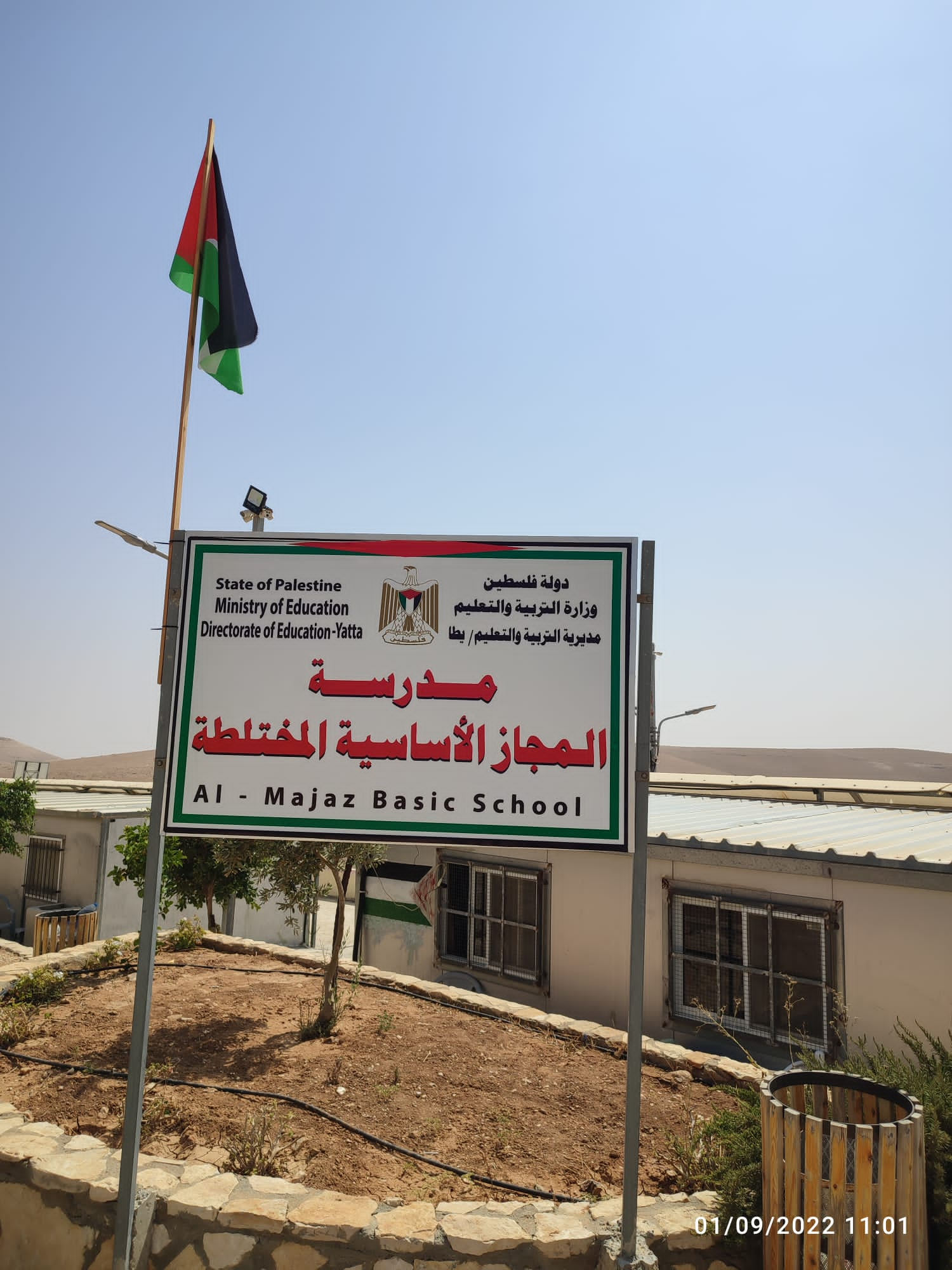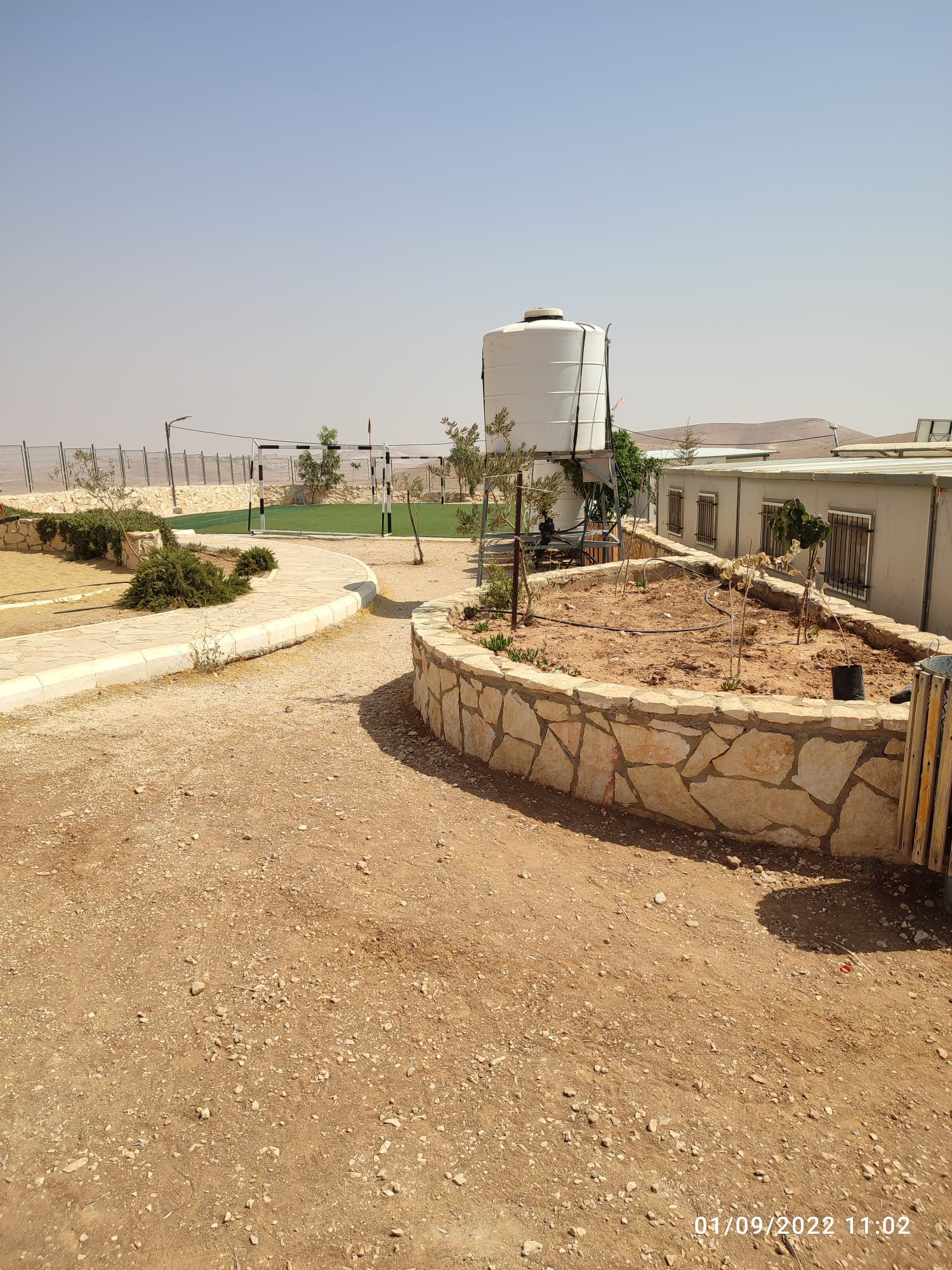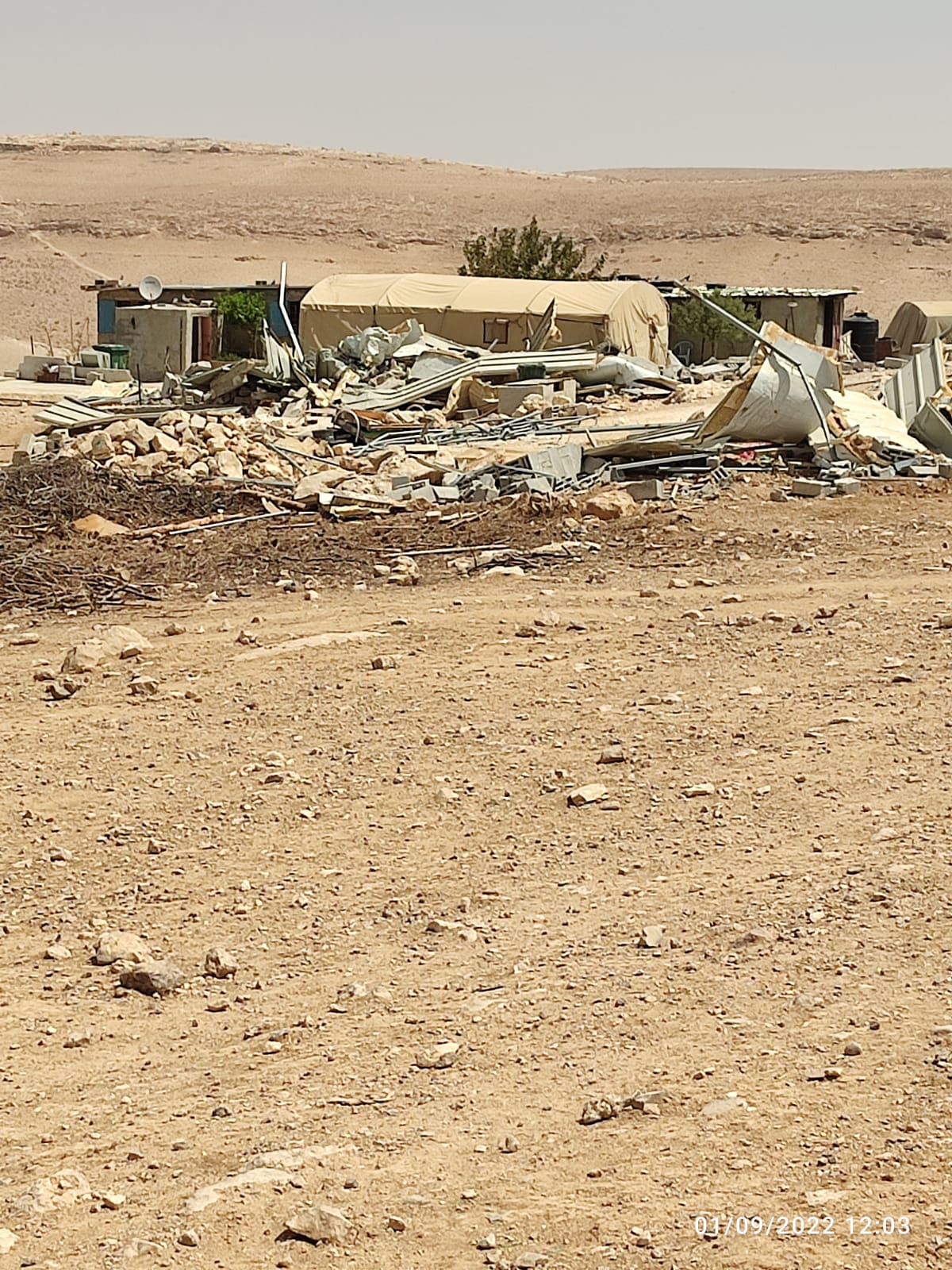‘As a headteacher you get to be part of the community. You realise how tough it is – this is what we Palestinians call ‘steadfastness’. You cannot desert people when the situation gets tough… I am so proud of my pupils and quite a number have gone on to study at higher education level.’
Jad Nawaja’a, Headteacher of Al Majaz Primary School, Masafer Yatta
At the end of a dusty track, high in the hills, the Al Majaz village primary school appears neat and well laid out. As well as three buildings housing classrooms and offices, the school has a small football ground at the front and a large playground at the back which doubles as a basketball court. The school serves the village of Al Majaz and its surrounding area, and many pupils walk quite a long distance to get to school each day from their homes.

Al Majaz village school entrance, Masafer Yatta

The football pitch at Al Majaz School, Masafer Yatta
While all this is reminiscent of rural schools in many countries the world, the Al Majaz school is far from typical. This is because the school lies inside an area known as Masafer Yatta, a large proportion of which was declared a closed military ‘firing zone’ by the Israeli authorities in the 1980s. Ever since, the Israeli military have been demolishing buildings and forcibly evicting Palestinian residents on the basis that they are ‘living illegally in a firing zone’. Already two villages, Khirbet Saraura and Kharoubeh, have been completely demolished and their residents forcibly moved away. These communities no longer exist.
According to Israeli human rights organisation, B’Tselem, the Israeli government uses a variety of mechanisms aimed at ‘preventing Palestinian development and dispossessing Palestinians of their land’. This includes for example, declaring Palestinian areas as nature reserves, national parks or archeological sites so people cannot live in them. In the case of Masafer Yatta, where the El Majaz school is, the land was declared ‘Firing Zone 918’ in 1993. Minutes of a 1981 ministerial meeting of the Israeli government demonstrate that the strategy of allocating this land to the Israeli military was intended to prevent the ‘expansion of the Arab villagers from the hills towards the desert’.
‘Israel’s planning policy is aimed at preventing Palestinian development and dispossessing Palestinians of their land, with a view to enabling Israel to use as much of the West Bank for its own needs.’
Israeli human righsts organisation, B’Tselem
Even though the Al Majaz primary school was funded by a range of international organisations and government donors, including the British government, it does not make their school immune from the threat of the bulldozers. The school has received repeated demolition warnings. They are also prohibited from making improvements to the buildings and extending the school. The Israeli authorities in the area have made several visits to the school and on one occasion confiscated a machine being used by workmen at the school.
According to Human Rights Watch at least 16 Palestinian schools were demolished or had buildings and property damaged by the Israeli authorities between 2010 and 2018.
This September marked the start of the first new school year following an Israeli court ruling in May 2022 which effectively ended all legal appeal routes for the communities of Masafer Yatta and gave the greenlight for the mass eviction of Palestinian residents. The situation since then has been getting increasingly difficult.
Communities across Masafer Yatta live with the constant threat of eviction. There has been a sharp increase in military presence in the area, and a number of homes and other structures have already been demolished.

This home in Al Majaz village, Masafer Yatta has been demolished three times. The family have given up on rebuilding and now live in the tent behind.
Impossible to have a ‘normal, daily routine’
Although the pupils can walk to their school in Al Majaz, their teachers, who mostly live in a nearby town some 40 minutes’ drive away, are finding it increasingly hard to get to school. The Israeli military have erected roadblocks and flying (‘pop-up’) checkpoints are routinely stopping the teachers from travelling. Their cars are at risk of confiscation and they face large fines and long delays to get them back. Instead the teachers have to leave their cars outside the area and walk for about 35 minutes to reach the school.
Jad Nawaja’a, the Headmaster of Al Majaz village school, says this makes it almost impossible to have a normal daily routine. When teachers arrive late or not at all because of military harassment on their journey, he is never quite sure how to plan the day. He says that the children and teachers are all affected by the frequent presence of soldiers both at the school and on their journeys to and from school. Soldiers have also began military training in the firing zone and there are frequent loud noises throughout the day from military explosions, both fairly nearby and in the distance, which is creating a sense of insecurity. Many families are having to think about the future of their children. The insecurity is affecting attendance and teachers are worried about the mental health and wellbeing of the children.
‘The Israeli military uses the area for training… which causes damage to Palestinians’ land and property.’
He says he has seen a lot of changes in the school since he started as headteacher eight years ago. Back then the school was housed in tents, but he managed to get funding to build the first classrooms constructed of concrete, and procure funding for books and other educational materials for the children. A few years later in 2019 they added four more classrooms. Now the school has grown to have 40 children in educational grades 1 to 9 and he has 11 teachers and three support staff.
Mr Nawaja’a is immensely proud of the school, its staff and teachers. He says it was not until the day he was appointed eight years ago that he even knew where Al Majaz was, but, he continues;
‘As a headteacher you get to be part of the community. You realise how tough it is – this is what we Palestinians call steadfastness. You cannot desert people when the situation gets tough… I am so proud of my pupils and quite a number have gone on to study at higher education level. We are very grateful for international support, and I feel that because of that the Israeli government hesitates to demolish our school. We have lawyers supporting us, but I have to say, after the May court ruling we are worried. It has become more difficult. Please tell the world we have been here hundreds of years. The Palestinians in Masafer Yatta are rooted in this area. It’s a rights issues. Our needs have to be respected: the people’s rights to education, health and access to land.’
Take action!
-
Join our URGENT Defend Masafer Yatta campaign here to call on the Israeli government to stop the illegal dispossession of Palestinians in Masafer Yatta.
-
Use our quick template letter to send this eyewitness story to your elected representatives and ask them to call upon Israel to ensure Palestinian children’s unobstructed right to an education, in compliance with international law.
-
Work in education or know someone who does? Check out and share ‘Razor Wire and Olive Branches‘, a teaching pack exploring conflict, human rights and peacebuilding in Palestine and Israel.

